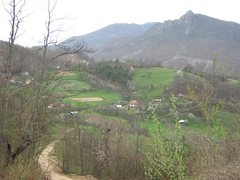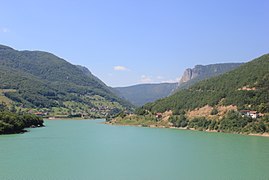Zubin Potok
Zubin Potok
| |
|---|---|
Town and municipality | |
 Holy Trinity Church, Zubin Potok | |
 Emblem | |
 Location of the municipality of Zubin Potok within Kosovo | |
| Coordinates: 42°55′N 20°41′E / 42.917°N 20.683°E | |
| Location | Kosovo[a] |
| District | District of Mitrovica |
| Settlements | 64 |
| Government | |
| • Provisional president | Srdjan Vulović (SL) |
| Area | |
| • Total | 335 km2 (129 sq mi) |
| • Land | 333 km2 (129 sq mi) |
| Elevation | 567 m (1,860 ft) |
| Population (2015) | |
| • Total | 15,200 |
| • Density | 45/km2 (120/sq mi) |
| est. | |
| Time zone | UTC+1 (CET) |
| • Summer (DST) | UTC+2 (CEST) |
| Postal code | 40650 |
| Area code(s) | +383(0)28 |
| Car plates | 02 |
| Website | www |
Zubin Potok (definite Albanian form: Zubin Potoku; Serbian Cyrillic: Зубин Поток); is a town and municipality located in the Mitrovica District in Kosovo.[a] As of 2015, it has an estimated population of 15,200 inhabitants.[1] It covers an area of 335 km2 (129 sq mi), and consists of the main town and 63 villages.
Zubin Potok is a part of North Kosovo, a region with an ethnic Serb majority that functions largely autonomously from the remainder of ethnic Albanian-majority Kosovo. After the 2013 Brussels Agreement, the municipality became part of the Community of Serb Municipalities.
Settlements[]
Aside from the town of Zubin Potok, these villages comprise the municipality of Zubin Potok:
- Babiće / Babiq
- Banja / Banjë
- Brnjak / Bërnjak
- Bube / Bubë
- Čabra / Çabër
- Čečevo / Çeçevë
- Češanoviće / Çeshanovë
- Crepulja / Crepulë
- Čitluk / Çitluk
- Donje Varage / Varagë e Ulët
- Drajinoviće / Drainovë
- Dren / Dreth
- Gornji Jasenovik / Jasenoviku i Epërm
- Gornji Strmac / Stramci i Epërm
- Jagnjenica
- Junake / Junce
- Kozarevo / Kozareva
- Krligate / Krligatë
- Lučka Reka / Lluçkarekë
- Međeđi Potok / Prroj i Megjës
- Oklace
- Rezala / Rezallë
- Rujište / Rujishtë
- Tušiće / Tushiqë
- Velika Kaludra / Kalludra e Madhe
- Velji Breg / Bregu i Madh
- Vojmisliće / Vojmisliq
- Zečeviće / Zeçevicë
- Zupče / Zupçë
Demographics[]
| Year | Pop. | ±% p.a. |
|---|---|---|
| 1991 | 8,700 | — |
| 1999 | 12,000 | +4.10% |
| 2015 | 15,200 | +1.49% |
According to the 2011 estimations by the Government of Kosovo, Zubin Potok has 1,698 households and 6,616 inhabitants.[2] In 2015 report by OSCE, the population of Zubin Potok municipality stands at 15,200 inhabitants.[1]
Ethnic groups[]
The majority of Zubin Potok municipality is composed of Kosovo Serbs with more than 13,900 inhabitants (91.5%), while 1,300 (8.5%) Kosovo Albanians live in the municipality.[1] Most of Zubin Potok's Kosovo Albanians live in the village of Çabër (Čabra).
The ethnic composition of the municipality of Zubin Potok, including IDPs:[3][1]
| Ethnic group | 1991 est. | 1999 est. | 2015 est. |
|---|---|---|---|
| Serbs | 7,750 | 11,000 | 13,900 |
| Albanians | 850 | 850 | 1,300 |
| Others | 100 | - | - |
| Total | 8,700 | 12,000 | 15,200 |
Geography and infrastructure[]
Location[]
| Novi Pazar (55 km) | Leposavić (42 km), Raška (73 km), Kraljevo (153 km), Belgrade (313 km) | |

|
North Mitrovica (21 km), Vučitrn (29 km) | |
| Istok (38 km), Peć (59 km) | Prizren (114 km) | Skenderaj (33 km), Pristina (57 km), Gračanica (62 km) |
Economy[]
Zubin Potok is an agricultural community, yet the level of agricultural production has been in decrease due to the lack of investment. Local factories have been also strongly affected by the lack of consumers in the Albanian parts of Kosovo. Since most factories were established as branches of main Serbian factory chains to serve the Kosovo market, their workers are still employed but work and get paid irregularly. A majority of products sold in the municipality are imported from Serbia.
Twin towns — sister cities[]
Zubin Potok is twinned with:
 Gradiška, Bosnia and Herzegovina, since 2021[4]
Gradiška, Bosnia and Herzegovina, since 2021[4]
Gallery[]

Holy Trinity Church in Zubin Potok

Brnjak Bridge near Gazivoda Lake

View above Gazivoda Lake
Gazivoda Lake

Village in Zubin Potok
See also[]
Notes and references[]
- Notes
- ^ Jump up to: a b Kosovo is the subject of a territorial dispute between the Republic of Kosovo and the Republic of Serbia. The Republic of Kosovo unilaterally declared independence on 17 February 2008. Serbia continues to claim it as part of its own sovereign territory. The two governments began to normalise relations in 2013, as part of the 2013 Brussels Agreement. Kosovo is currently recognized as an independent state by 97 out of the 193 United Nations member states. In total, 113 UN member states are said to have recognized Kosovo at some point, of which 15 later withdrew their recognition.
- References
- ^ Jump up to: a b c d "Zubin Potok". osce.org. OSCE. Retrieved 19 August 2017.
- ^ "ESTIMATION of Kosovo population 2011" (PDF). ask.rks-gov.net. Government of Kosovo. Retrieved 19 August 2017.
- ^ "OSCEOrganization for Security and Co-operation in Europe". osce.org. Organization for Security and Co-operation in Europe. Archived from the original on 6 June 2011. Retrieved 19 August 2017.
- ^ "Пoбрaтимски грaдoви". gradgradiska.com (in Serbian). Gradiška. 2021-04-24. Retrieved 2021-04-24.
External links[]
| Wikimedia Commons has media related to Zubin Potok. |
- Official website (in Serbian)
- IOM Kosovo
- Zubin Potok
- North Kosovo
- Municipalities of Kosovo
- Kosovo–Serbia border crossings
- Cities in Kosovo






